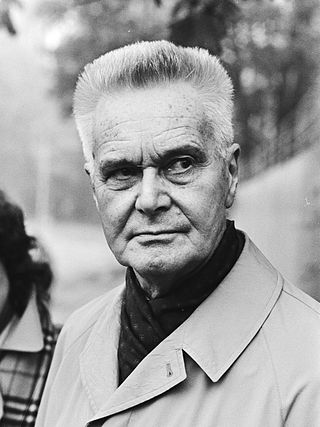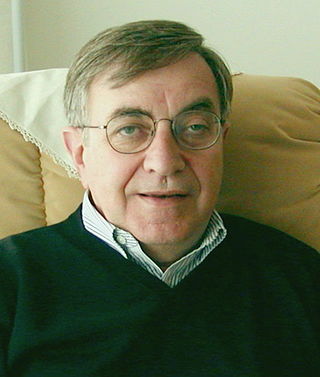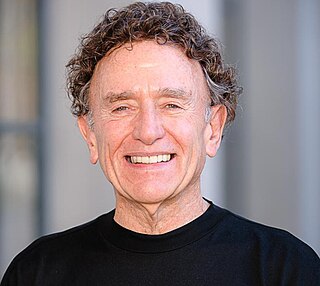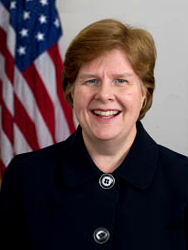
Jan Tinbergen was a Dutch economist who was awarded the first Nobel Memorial Prize in Economic Sciences in 1969, which he shared with Ragnar Frisch for having developed and applied dynamic models for the analysis of economic processes. He is widely considered to be one of the most influential economists of the 20th century and one of the founding fathers of econometrics.

Erasmus University Rotterdam is a public research university located in Rotterdam, Netherlands. The university is named after Desiderius Erasmus Roterodamus, a 15th-century Christian humanist and theologian.

Hans-Werner Sinn is a German economist who served as President of the Ifo Institute for Economic Research from 1999 to 2016. He currently serves on the German economy ministry’s advisory council. He is Professor Emeritus of Economics and Public Finance at the University of Munich.

Foundation for European Economic Development (FEED) is a charity formed in November 1990 under the auspices of the European Association for Evolutionary Political Economy. The charity is formally registered under the Charities Act 2006. It has provided financial assistance for various projects and organisations, including research prize competitions, summer schools, conferences, and other research events.

The pluralism in economics movement is a campaign to change the teaching and research in economics towards more openness in its approaches, topics and standpoints it considers. The goal of the movement is to "reinvigorate the discipline ... [and bring] economics back into the service of society". Some have argued that economics had greater scientific pluralism in the past compared to the monist approach that is prevalent today. Pluralism encourages the inclusion of a wide variety of neoclassical and heterodox economic theories—including classical, Post-Keynesian, institutional, ecological, evolutionary, feminist, Marxist, and Austrian economics, stating that "each tradition of thought adds something unique and valuable to economic scholarship".

Elhanan Helpman is an Israeli economist who is currently the Galen L. Stone Professor of International Trade at Harvard University. He is also a Professor Emeritus at the Eitan Berglas School of Economics at Tel Aviv University. Helpman is among the thirty most cited economists in the world according to IDEAS/RePEc.

Gordon Rausser is an American economist. He is currently the Robert Gordon Sproul Distinguished Professor Emeritus, Dean Emeritus, at Rausser College of Natural Resources and more recently, a professor of the graduate school at the University of California, Berkeley. On three separate occasions, he served as chairman of the Department of Agriculture and Resource Economics, served two terms as Dean of the Rausser College of Natural Resources, and has served on the board of trustees of public universities and one private university. Rausser has been appointed to more than 20 board of directors of both private and publicly traded companies, including chairman of several of such boards.

The European Economic Association (EEA) is a professional academic body which links European economists. It was founded in the mid-1980s. Its first annual congress was in 1986 in Vienna and its first president was Jacques Drèze. The current president is Maristella Botticini. The Association currently has around 4000 members. Its objectives are:
".. . to contribute to the development and application of economics as a science in Europe; to improve communication and exchange between teachers, researchers and students in economics in the different European countries; and to develop and sponsor co-operation between teaching institutions of university level and research institutions in Europe "

Nobuhiro Kiyotaki FBA is a Japanese economist and the Harold H. Helms '20 Professor of Economics and Banking at Princeton University. He is especially known for proposing several models that provide deeper microeconomic foundations for macroeconomics, some of which play a prominent role in New Keynesian macroeconomics.

Christina Duckworth Romer is the Class of 1957 Garff B. Wilson Professor of Economics at the University of California, Berkeley and a former chair of the Council of Economic Advisers in the Obama administration. She resigned from her role on the Council of Economic Advisers on September 3, 2010.

The Nobel Memorial Prize in Economic Sciences, officially the Sveriges Riksbank Prize in Economic Sciences in Memory of Alfred Nobel, is an economics award funded by Sveriges Riksbank and administered by the Nobel Foundation.

Armin Falk is a German economist. He has held a chair at the University of Bonn since 2003.
The Yrjö Jahnsson Foundation is a charitable foundation whose aims are to promote Finnish research in economics and medicine and to maintain and support educational and research facilities in Finland. It was established in 1954 by the wife of Yrjö Jahnsson, Hilma Jahnsson. It supports the award of the Yrjö Jahnsson Award and Yrjö Jahnsson Lecture series. These lectures have been delivered by noteworthy economists since 1963. 10 of the Yrjö Jahnsson Lecture series scholars have gone on to win the Nobel prize in economics, making it a top predictor for future recipients.

Guido Wilhelmus Imbens is a Dutch-American economist whose research concerns econometrics and statistics. He holds the Applied Econometrics Professorship in Economics at the Stanford Graduate School of Business at Stanford University, where he has taught since 2012.
Wendy Joan Carlin, is a professor of economics at University College London, expert advisor to the Office for Budget Responsibility, and research fellow at the Centre for Economic Policy Research. Her research focuses on macroeconomics, institutions and economic performance, and the economics of transition.
Giorgio Brunello is an Italian economist and Professor of Economics at the University of Padova. His research interests include education, migration, training, unemployment and wages. He ranks among the foremost labour economists in Italy.

Jan C. van Ours is a Dutch economist and currently Professor of Applied Economics at the Erasmus University Rotterdam (EUR). He belongs to the most highly cited economists in the Netherlands and is the 1996 winner of the Hicks-Tinbergen Award.
Camille Landais is a French economist who currently works as Professor of economics at the London School of Economics. His research focuses on public finance and labour economics. In 2016, Landais was awarded the Prize of Best Young Economist of France for his research on the relationship between changes in inequality and fiscal and social policy.
Ekaterina Zhuravskaya is a Professor of Economics at the Paris School of Economics and EHESS. She was formerly a professor at New Economic School in Moscow and the academic director of the Center for Economic and Financial Research, the school's policy-oriented think tank. She was the 2018 recipient of the Birgit Grodal. She was given a biennial award as a "a European-based female economist who has made a significant contribution to the Economics profession." In 2021 she was named a Fellow of the Econometric Society.
The 2021 Nobel Memorial Prize in Economic Sciences was divided one half awarded to the American-Canadian David Card "for his empirical contributions to labour economics", the other half jointly to Israeli-American Joshua Angrist and Dutch-American Guido W. Imbens "for their methodological contributions to the analysis of causal relationships." The Nobel Committee stated their reason behind the decision, saying:
"This year's Laureates – David Card, Joshua Angrist and Guido Imbens – have shown that natural experiments can be used to answer central questions for society, such as how minimum wages and immigration affect the labour market. They have also clarified exactly which conclusions about cause and effect can be drawn using this research approach. Together, they have revolutionised empirical research in the economic sciences."













